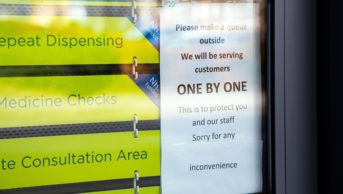
It is safe to say that no one is happy with the current community pharmacy contract. Pharmacists want fair remuneration of their work following the 6% cut to community pharmacy funding. The government wants pharmacy to become more integrated in the healthcare system, but its Pharmacy Integration Fund has been met with little success.
Meanwhile, the Pharmaceutical Services Negotiating Committee (PSNC) wants a framework that “fairly rewards community pharmacies for offering a wide range of patient care and services”, particularly for people with long-term conditions. The Department and Health and Social Care has signalled that it is open to considering this vision when contract negotiations begin.
But if pharmacists could dictate the contents of their contract, what would they do? Would they scrap medicines use reviews (MURs) and the new medicines service (NMS)? Would they implement new models of remuneration? The Pharmaceutical Journal spoke to pharmacy leaders and pharmacists on the ground to find out.
- Switch to a ’service-based’ contract
- Pay pharmacists a share of savings
- Mental health support embedded into MURs
- National scheme to widen services
- Rewards for pharmacists who identify illness
- Bigger role in managing long-term conditions
- New ways of working
Switch to a ‘service-based’ contract

Mike Holden, principal associate, Pharmacy Complete
Pharmacists should work with patients with long-term conditions to develop a care plan — with input from the prescriber as required. This should replace the current MURs, NMS and opportunistic advice on dispensing, with evidence of what has been provided required for pharmacists to be recognised and appropriately remunerated.
We need to move away from a supply management activity fee and a package based on retained-margin-on-procurement remuneration, to a package that is fair, quality-driven, care-led and service-based. This may mean losing the current advanced service tier, and moving a pharmaceutical care service, flu vaccination and other national services into the essential services tier. A funded quality scheme would underpin this. Enhanced services should be locally commissioned based on the population’s needs and ability to deliver outcomes.
We require changes not only to the contractual framework, remuneration and reimbursement systems but also, more importantly, a cultural and practice shift for pharmacy and all involved in patient care.
Pay pharmacists a share of savings

Emmanuel Chisadza, locum pharmacist, Dorset and Hampshire
Asthma would be an ideal long-term condition to start with. Many pharmacists already work with people with asthma during MURs, the NMS and inhaler technique assessments. Pharmacists could work to agreed outcomes and action plans, and be remunerated on the basis of compliance assessment, peak expiratory flow monitoring, inhaler technique training, breathlessness and wheezing rates, adverse reactions and toxicity events, and hospital admissions.
A bundled payment model for remuneration comes to mind, or a payment-for-performance model — like the quality and outcomes framework in general practice — could be used to achieve desired patient outcomes and value for the commissioners. Financial incentives, performance improvement thresholds and clawbacks for under-performance could be used.
I favour a shared savings model, which rewards contractors who reduce total asthma therapy spending below an agreed level set by the commissioners and the PSNC. Commissioners spend less on treatment, and contractors get a share of the savings.
Mental health support embedded into MURs

Ade Williams, community pharmacist, Bristol
We need to broaden the MUR to cover mental health conditions, so parity between physical and mental health — enshrined in the Health and Social Care Act 2012 — is truly embedded across the whole NHS. Long-term health conditions have an impact on mental health, and poor mental health can, over time, be detrimental to physical health. Medication compliance in these patients can be challenging; why not allow community pharmacy to support them by providing more holistic care?
Locally addressing the factors that protect health and wellbeing really drives positive health outcomes. Many of these factors are at a community level, so the community pharmacy should be at the centre. Pharmacy needs nationally commissioned social prescribing, weight-management and smoking-cessation services.
Bringing together the various streams of work community pharmacy does in a contract is ambitious, but it is the only way to fully harness our expertise.
National scheme to widen services

Sandra Gidley, locum pharmacist, Hampshire, and member of the Royal Pharmaceutical Society English Pharmacy Board
The pharmacy contract should ensure pharmacists are paid for clinical services that benefit patients. They’re getting better use from and understanding of their medicines. And pharmacists are getting paid to really use their Masters’ degrees, knowing they’re having a direct impact on the patient.
So many services that can be provided have been shown to be cost effective — from measuring warfarin, to looking after a caseload of patients with diabetes, to in-depth asthma reviews — that I almost don’t care what the services are, but they need to be nationally commissioned, otherwise variability in provision across the country becomes confusing for patients.
At the moment, pharmacists delivering services are paid a set amount for each one they do, but perhaps you could look at, say, 50–60 asthma patients over a year, which could attract a fee. We need to make sure this does not come out of the money that often funds the supply side. Eventually we will have a more professionally remunerated contract, but it would be nice to see one big initiative that is funded separately in the meantime.
Rewards for pharmacists who identify illness

Hala Jawad, practice and community pharmacist, Surrey
Any advances in services, and all future enhancements to public health delivery through community pharmacy, must be underpinned by a fair return for the investment contractors because of the unintended consequences of the current squeeze on contractors’ remuneration and the sustainability of the community pharmacy service. This has knock-on effects on the entire pharmacy workforce — not just contractors.
The community pharmacy contract should also evolve to deliver higher levels of patient and public service through adding more value to the supply function. There is a huge potential contribution that medicines optimisation can make to improve the quality of thousands of lives and make savings for the NHS. The contract should also evolve such that pharmaceutical care can be extended to mental health, domestic and care-home settings where need dictates. This would provide great benefit to those patients most at risk, and that the pharmacist could play an increasing role in illness detection and successful treatment. The Royal Pharmaceutical Society’s English Pharmacy Board will develop a case for MURs and the NMS to be provided in this way.
Bigger role in managing long-term conditions

Tony Schofield, community pharmacist, South Tyneside
Prescribing pharmacists could manage long-term conditions — such as chronic obstructive pulmonary disease, asthma, hypertension and type 2 diabetes — in the pharmacy, rather than in general practice. They could do it under a service-level agreement or similar. Pharmacies can provide better access as they are more generously distributed than surgeries. The quality of community pharmacists is not in doubt, but we would need electronic links with practices and read/write access.
We should also be contracted to do screening. Healthy Living Pharmacies should do more than have displays. Pharmacies can offer blood pressure testing, cardiovascular health checks, hepatitis screening, atrial fibrillation screening, and diabetes screening. But the patient is later dumped on general practice to manage. GPs are melting down with the pressure, and more are leaving the profession than are being attracted. The burden must be lifted from GPs, and pharmacists managing long-term conditions is a good start.
New ways of working

Rod Tucker, community pharmacist, Yorkshire
Today, further development of clinical services is hampered by an increasing prescription volume, a reduction in support staff, and the unpredictable nature of the pharmacy workload.
A solution to these problems could be greater use of hub-and-spoke models, the growth of online pharmacies and possible relaxation of the supervision requirements. While some may perceive these developments as threats, I see them as opportunities that will allow pharmacists to achieve the aspirations of the new contract.
We have already seen the value of recent initiatives (such as atrial fibrillation screening and sore-throat testing) and the uptake of pharmacy flu vaccinations is testament to the potential value of greater clinical services. I believe that future roles should focus on supporting medicine optimisation for those with long-term conditions. And it is vital for any new clinical services to have measurable outcomes, which, in some instances, would necessitate patients returning to see the pharmacist.
Tell us what you think should be in the new community pharmacy contract. Get in touch with our opinion editor at: abigail.james@rpharms.com


